- Home
- Kahlil Gibran
Collected Poetical Works of Kahlil Gibran Page 26
Collected Poetical Works of Kahlil Gibran Read online
Page 26
No sooner did the lovely stranger appear in their sight than the young men sought her and surrounded her. One would dance with her, and another would cut a cake in her honour. And they all desired to kiss her cheek. For after all, was it not the Fair?
But the girl was shocked and started, and she thought ill of the young men. She rebuked them, and she even struck one or two of them in the face. Then she ran away from them.
And on her way home that evening she was saying in her heart, “I am disgusted. How unmannerly and ill bred are these men. It is beyond all patience.”
A year passed during which that very comely girl thought much of Fairs and men. Then she came again to the Fair with the lily and the rose in her face, the sunset in her hair and the smile of dawn upon her lips.
But now the young men, seeing her, turned from her. And all the day long she was unsought and alone.
And at eventide as she walked the road toward her home she cried in her heart, “I am disgusted. How unmannerly and ill bred are these youths. It is beyond all patience.”
THE TWO PRINCESSES
In the city of Shawakis lived a prince, and he was loved by everyone, men and women and children. Even the animals of the field came unto him in greeting.
But all the people said that his wife, the princess, loved him not; nay, that she even hated him.
And upon a day the princess of a neighbouring city came to visit the princess of Shawakis. And they sat and talked together, and their words led to their husbands.
And the princess of Sharakis said with passion, “I envy you your happiness with the prince, your husband, though you have been married these many years. I hate my husband. He belongs not to me alone, and I am indeed a woman most unhappy.”
Then the visiting princess gazed at her and said, “My friend, the truth is that you love your husband. Aye, and you still have him for a passion unspent, and that is life in woman like unto Spring in a garden. But pity me, and my husband, for we do but endure one another in silent patience. And yet you and others deem this happiness.”
THE LIGHTNING FLASH
There was a Christian bishop in his cathedral on a stormy day, and an un-Christian woman came and stood before him, and she said, “I am not a Christian. Is there salvation for me from hell-fire?”
And the bishop looked upon the woman, and he answered her saying, “Nay, there is salvation for those only who are baptized of water and of the spirit.”
And even as he spoke a bolt from the sky fell with thunder upon the cathedral and it was filled with fire. And the men of the city came running, and they saved the woman, but the bishop was consumed, food of the fire.
THE HERMIT AND THE BEASTS
Once there lived among the green hills a hermit. He was pure of spirit and white of heart. And all the animals of the land and all the fowls of the air came to him in pairs and he spoke unto them. They heard him gladly, and they would gather near unto him, and would not go until nightfall, when he would send them away, entrusting them to the wind and the woods with his blessing.
Upon an evening as he was speaking of love, a leopard raised her head and said to the hermit, “You speak to us of loving. Tell us, Sir, where is your mate?”
And the hermit said, “I have no mate.”
Then a great cry of surprise rose from the company of beasts and fowls, and they began to say among themselves, “How can he tell us of loving and mating when he himself knows naught thereof?” And quietly and in distain they left him alone.
That night the hermit lay upon his mat with his face earthward, and he wept bitterly and beat his hands upon his breast.
THE PROPHET AND THE CHILD
Once on a day the prophet Sharia met a child in a garden. The child ran to him and said, “Good morrow to you, Sir,” and the prophet said, “Good morrow to you, Sir.” And in a moment, “I see that you are alone.”
Then the child said, in laughter and delight, “It took a long time to lose my nurse. She thinks I am behind those hedges; but can’t you see that I am here?” Then he gazed at the prophet’s face and spoke again. “You are alone, too. What did you do with your nurse?”
The prophet answered and said, “Ah, that is a different thing. In very truth I cannot lose her oftentime. But now, when I came into this garden, she was seeking after me behind the hedges.”
The child clapped his hands and cried out, “So you are like me! Isn’t it good to be lost?” And then he said, “Who are you?”
And the man answered, “They call me the prophet Sharia. And tell me, who are you?”
“I am only myself,” said the child, “and my nurse is seeking after me, and she does not know where I am.”
Then the prophet gazed into space saying, “I too have escaped my nurse for awhile, but she will find me out.”
And the child said, “I know mine will find me out too.”
At that moment a woman’s voice was heard calling the child’s name, “See,” said the child, “I told you she would be finding me.”
And at the same moment another voice was heard, “Where art thou, Sharia?”
And the prophet said, “See my child, they have found me also.”
And turning his face upward, Sharia answered, “Here I am.”
THE PEARL
Said one oyster to a neighbouring oyster, “I have a very great pain within me. It is heavy and round and I am in distress.”
And the other oyster replied with haughty complacence, “Praise be to the heavens and to the sea, I have no pain within me. I am well and whole both within and without.”
At that moment a crab was passing by and heard the two oysters, and he said to the one who was well and whole both within and without, “Yes, you are well and whole; but the pain that your neighbour bears is a pearl of exceeding beauty.”
BODY AND SOUL
A man and a woman sat by a window that opened upon Spring. They sat close one unto the other. And the woman said, “I love you. You are handsome, and you are rich, and you are always well-attired.”
And the man said, “I love you. You are a beautiful thought, a thing too apart to hold in the hand, and a song in my dreaming.”
But the woman turned from him in anger, and she said, “Sir, please leave me now. I am not a thought, and I am not a thing that passes in your dreams. I am a woman. I would have you desire me, a wife, and the mother of unborn children.”
And they parted.
And the man was saying in his heart, “Behold another dream is even now turned into mist.”
And the woman was saying, “Well, what of a man who turns me into a mist and a dream?”
THE KING
The people of the kingdom of Sadik surrounded the palace of their king shouting in rebellion against him. And he came down the steps of the palace carrying his crown in one hand and his sceptre in the other. The majesty of his appearance silenced the multitude, and he stood before them and said, “My friends, who are no longer my subjects, here I yield my crown and sceptre unto you. I would be one of you. I am only one man, but as a man I would work together with you that our lot may be made better. There is no need for king. Let us go therefore to the fields and the vineyards and labour hand with hand. Only you must tell me to what field or vineyard I should go. All of you now are king.”
And the people marvelled, and stillness was upon them, for the king whom they had deemed the source of their discontent now yielding his crown and sceptre to them and became as one of them.
Then each and every one of them went his way, and the king walked with one man to a field.
But the Kingdom of Sadik fared not better without a king, and the mist of discontent was still upon the land. The people cried out in the market places saying that they have a king to rule them. And the elders and the youths said as if with one voice, “We will have our king.”
And they sought the king and found him toiling in the field, and they brought him to his seat, and yielded unto his crown and his sceptre. And they said, “Now rule
us, with might and with justice.”
And he said, “I will indeed rule you with might, and may the gods of the heaven and the earth help me that I may also rule with justice.”
Now, there came to his presence men and women and spoke unto him of a baron who mistreated them, and to whom they were but serfs.
And straightway the king brought the baron before him and said, “The life of one man is as weighty in the scales of God as the life of another. And because you know not how to weigh the lives of those who work in your fiends and your vineyards, you are banished, and you shall leave this kingdom forever.”
The following day came another company to the king and spoke of the cruelty of a countess beyond the hills, and how she brought them down to misery. Instantly the countess was brought to court, and the king sentenced her also to banishment, saying, “Those who till our fields and care for our vineyards are nobler than we who eat the bread they prepare and drink the wine of their wine-press. And because you know not this, you shall leave this land and be afar from this kingdom.”
Then came men and women who said that the bishop made them bring stones and hew the stones for the cathedral, yet he gave them naught, though they knew the bishop’s coffer was full of gold and silver while they themselves were empty with hunger.
And the king called for the bishop, and when the bishop came the king spoke and said unto his, “That cross you wear upon your bosom should mean giving life unto life. But you have taken life from life and you have given none. Therefore you shall leave this kingdom never to return.”
Thus each day for a full moon men and women came to the king to tell him of the burdens laid upon them. And each and every day a full moon some oppressor was exiled from the land.
And the people of Sadik were amazed, and there was cheer in their heart.
And upon a day the elders and the youths came and surrounded the tower of the king and called for him. And he came down holding his crown with one hand and his sceptre with the other.
And he spoke unto and said, “Now, what would you do of me? Behold, I yield back to you that which you desired me to hold.”
But they cried. “Nay, nay, you are our rightful king. You have made clean the land of vipers, and you have brought the wolves to naught, and we welcome to sing our thanksgiving unto you. The crown is yours in majesty and the sceptre is yours in glory.”
Then the king said, “Not I, not I. You yourselves are king. When you deemed me weak and a misruler, you yourselves were weak and misruling. And now the land fares well because it is in your will. I am but a thought in the mind of you all, and I exist not save in your actions. There is no such person as governor. Only the governed exist to govern themselves.”
And the king re-entered his tower with his crown and his sceptre. And the elders and the youths went their various ways and they were content.
And each and every one thought of himself as king with a crown in one hand and a sceptre in the other.
UPON THE SAND
Said one man to another, “At the high tide of the sea, long ago, with the point of my staff I wrote a line upon the sand; and the people still pause to read it, and they are careful that naught shall erase it.”
And the other man said, “And I to wrote a line upon the sand, but it was at low tide, and the waves of the vast sea washed it away. But tell me, what did you write?”
And the first man answered and said, “I wrote this: ‘I am he who is.’ But what did you write?”
And the other man said, “This I wrote: ‘I am but a drop of this great ocean.’”
THE THREE GIFTS
Once in the city of Becharre there lived a gracious prince who was loved and honoured by all his subjects.
But there was one exceedingly poor man who was bitter against the prince, and who wagged continually a pestilent tongue in his dispraise.
The prince knew this, yet he was patient.
But at last he bethought him; and upon a wintry night there came to the door of the man a servant of the prince, bearing a sack of flour, a bag of soap and a cone of sugar.
And the servant said, “The prince sends you these gifts in token of remembrance.”
The man was elated, for he thought the gifts were an homage from the prince. And in his pride we went to the bishop and told him what the prince had done, saying, “Can you not see how the prince desires my goodwill?”
But the bishop said, “Oh, how wise a prince, and how little you understand. He speaks in symbols. The flour is for your empty stomach; the soap is for your dirty hide; and the sugar is to sweeten your bitter tongue.”
From that day forward the man became shy even of himself. His hatred of the prince was greater than ever, and even more he hated the bishop who had revealed the prince unto him.
But thereafter he kept silent.
PEACE AND WAR
Three dogs were basking in the sun and conversing. The first dog said dreamily, “It is indeed wondrous to be living in this day of dogdom. Consider the ease with which we travel under the sea, upon the earth and even in the sky. And meditate for a moment upon the inventions brought forth for the comfort of dogs, even for our eyes and ears and noses.”
And the second dog spoke and he said, “We are more heedful of the arts. We bark at the moon more rhythmically than did our forefathers. And when we gaze at ourselves in the water we see that our features are clearer than the features of yesterday.”
Then the third dog spoke and said, “But what interests me most and beguiles my mind is the tranquil understanding existing between dogdoms.”
At that very moment they looked, and lo, the dog-catcher was approaching.
The three dogs sprang up and scampered down the street; and as they ran the third dog said, “For God’s sake, run for your lives. Civilization is after us.”
THE DANCER
Once there came to the court of the Prince of Birkasha a dancer with her musicians. And she was admitted to the court, and she danced before the prince to the music the lute and the flute and the zither.
She danced the dance of flames, and the dance of swords and spears; she danced the dance of stars and the dance of space. And then she danced the dance of flowers in the wind.
After this she stood before the throne of the prince and bowed her body before him. And the prince bade her to come nearer, and he said unto her, “Beautiful woman, daughter of grace and delight, whence comes your art? And how is it that you command all the elements in your rhythms and your rhymes?”
And the dancer bowed again before the prince, and she answered, “Mighty and gracious Majesty, I know not the answer to your questionings. Only this I know: The philosopher’s soul dwells in his head, the poet’s soul is in the heart; the singer’s soul lingers about his throat, but the soul of the dancer abides in all her body.”
THE TWO GUARDIAN ANGELS
On an evening two angels met at the city gate, and they greeted one another, and they conversed.
The one angel said, “What are you doing these days, and what work is given you?”
And the other answered, “It was been assigned me to be the guardian of a fallen man who lives down in the valley, a great sinner, most degraded. Let me assure you it is an important task, and I work hard.”
The first fallen angel said, “That is an easy commission. I have often known sinners, and have been their guardian many a time. But it has now been assigned me to be the guardian of the good saint who lives in a bower out yonder. And I assure you that is an exceedingly difficult work, and most subtle.”
Said the first angel, “This is but assumption. How can guarding a saint be harder than guarding a sinner?”
And the other answered, “What impertinence, to call me assumptious! I have stated but the truth. Methinks it is you who are assumptious!”
Then the angels wrangled and fought, first with words and then with fists and wings.
While they were fighting an archangel came by. And he stopped them, and said, “Why do you fig
ht? And what is it all about? Know you not that it is most unbecoming for guardian angels to fight at the city gate? Tell me, what is your disagreement?”
Then both angels spoke at once, each claiming that the work given him was the harder, and that he deserved the greater recognition.
The archangel shook his head and bethought him.
Then he said, “My friends, I cannot say now which one of you has the greater claim upon honour and reward. But since the power is bestowed in me, therefore for peace’ sake and for good guardianship, I give each of you the other’s occupation, since each of you insists that the other’s task is the easier one. Now go hence and be happy at your work.”
The angels thus ordered went their ways. But each one looked backward with greater anger at the archangel. And in his heart each was saying, “Oh, these archangels! Every day they make life harder and still harder for us angels!”
But the archangel stood there, and once more he bethought him. And he said in his heart, “We have indeed, to be watchful and to keep guard over our guardian angels.”
THE STATUE
Once there lived a man among the hills who possessed a statue wrought by an ancient master. It lay at his door face downward and he was not mindful of it.
One day there passed by his house a man from the city, a man of knowledge, and seeing the statue he inquired of the owner if he would sell it.
The owner laughed and said, “And pray who would want to buy that dull and dirty stone?”
The man from the city said, “I will give you this piece of silver for it.”
And the other man was astonished and delighted.
The statue was removed to the city, upon the back of and elephant. And after many moons the man from the hills visited the city, and as he walked the streets he saw a crowd before a shop, and a man with a loud voice was crying, “Come ye in and behold the most beautiful, the most wonderful statue in all the world. Only two silver pieces to look upon this most marvellous work of a master.”

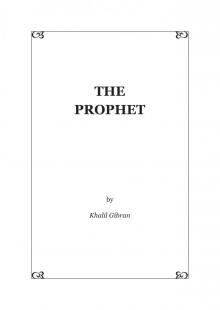 The Prophet
The Prophet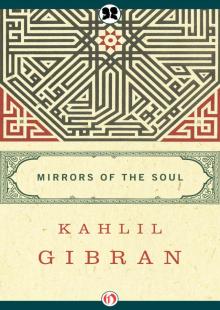 Mirrors of the Soul
Mirrors of the Soul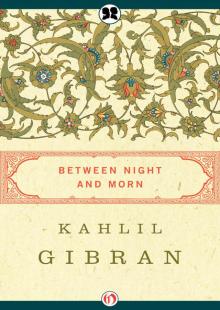 Between Night and Morn
Between Night and Morn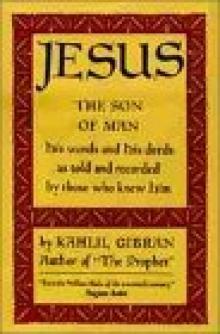 Jesus the Son of Man
Jesus the Son of Man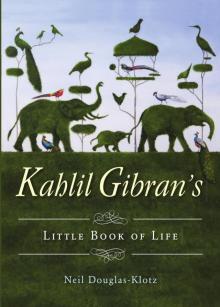 The Little Book of Life's Wisdom
The Little Book of Life's Wisdom The Kahlil Gibran Collection
The Kahlil Gibran Collection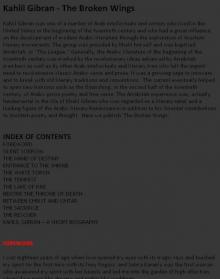 The Broken Wings
The Broken Wings Collected Poetical Works of Kahlil Gibran
Collected Poetical Works of Kahlil Gibran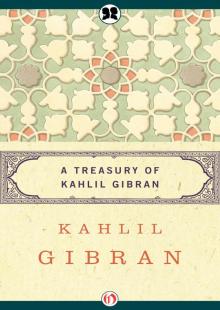 The Treasured Writings of Kahlil Gibran
The Treasured Writings of Kahlil Gibran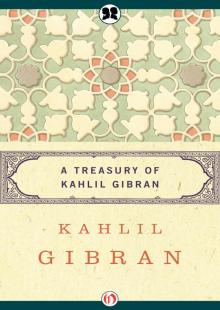 Treasury of Kahlil Gibran
Treasury of Kahlil Gibran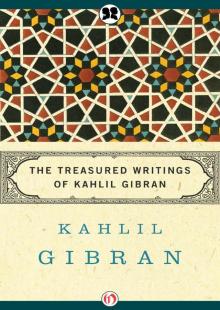 Treasured Writings of Kahlil Gibran
Treasured Writings of Kahlil Gibran